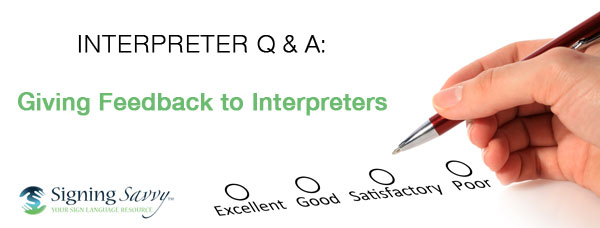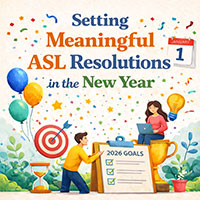
Interpreter Q & A: Giving Feedback to Interpreters
This article is part of our "Dear BC, Interpreter Q & A” series, which answers questions on interpreting and Deaf culture from multiple perspectives. There isn’t always one “right” answer to every question, and different people have different opinions on how to handle different scenarios. That is why more than one perspective is provided in this series, however, more opinions always exist. These perspectives are gathered from talking with experienced interpreters and deaf consumers from across the United States and Canada and do not solely come from the author.
Interpreters who are not easy to lip-read can be rough for me to understand. It makes it difficult for me to know the tone of the conversation. A lack of proper facial expressions just further compounds the problem. Is this something I should point out to even a nationally certified interpreter?
Sincerely,
Trying to be constructive
An Experienced Interpreter's Perspective:
Based on my experience, I think most interpreters – nationally certified, pre-certified, ITP students – appreciate feedback and are willing to attempt to immediately put the feedback to use. Being nationally certified does not mean that an interpreter is unable to benefit from suggestions, feedback or exploration of new ideas.
If the interpreter is difficult to lip-read (and that is something that person might not be able to change), I think it is fine to tell the interpreter that you will be relying even more on facial expression during the meeting. I always appreciate that kind of heads-up because it gives me a better take on the deaf person’s perspective and I can attempt to adjust my work accordingly.
Certified or not, let interpreters know what you’re thinking.
Experienced Deaf Consumer's Perspective:
I feel that any time you are not happy about what the interpreter is doing; your concerns should be made known. This is especially crucial when the delivery of the message from the interpreter interferes with complete comprehension of the message.
Your example of not being able to lip-read is one issue and not having any visible facial expressions which help clarify the message is another issue. Each issue should be addressed as they are both significant issues to be looked at. It would be appropriate for you and the interpreter to look at each issue and see how improvements/modifications can be made.
A nationally certified interpreter should definitely be told of these issues because they need to adjust their skills to meet different needs of different consumers. If they are not meeting your needs, you can feel better about telling them because they have invested a lot in the process of becoming a nationally certified interpreter and usually they have the Deaf consumer’s best interests at heart.
ADVERTISEMENTS
 Brenda Cartwright is a Coda, seasoned interpreter, a master teacher, well known presenter, and author of several best selling sign language and interpreting textbooks from the RID Press. For 35 years Brenda was the Chair of the Sign Language Interpreter Program at Lansing Community College in Lansing, Michigan.
Brenda Cartwright is a Coda, seasoned interpreter, a master teacher, well known presenter, and author of several best selling sign language and interpreting textbooks from the RID Press. For 35 years Brenda was the Chair of the Sign Language Interpreter Program at Lansing Community College in Lansing, Michigan. Interpreter 4-1-1: Top 10 Pearls of Wisdom for Interpreters
Interpreter 4-1-1: Top 10 Pearls of Wisdom for Interpreters Interpreter Q & A: Interpreter Credentials
Interpreter Q & A: Interpreter Credentials Interpreter Q & A: When Interpreters Omit Information
Interpreter Q & A: When Interpreters Omit Information






